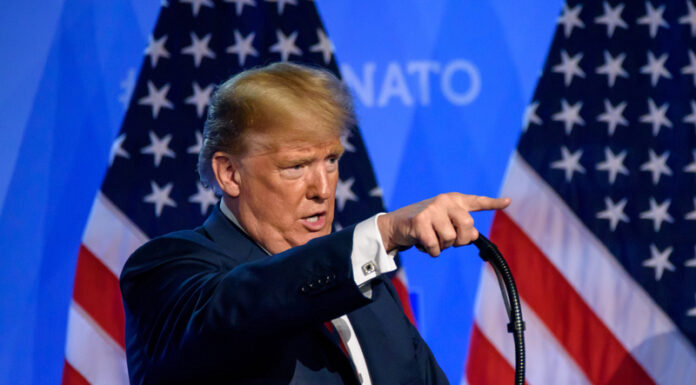President Donald Trump launched a scathing attack against Representative Thomas Massie of Kentucky on Sunday, June 22, denouncing the Republican lawmaker in a social media post that highlighted growing tensions within the party over foreign policy and legislative priorities.
The confrontation emerged after Trump had addressed the nation Saturday night following U.S. strikes on Iranian nuclear facilities. In his Sunday post on Truth Social, the President criticized Massie for objecting to military action without specific congressional approval, describing the strikes as achieving “spectacular military success yesterday.”
The verbal assault came as Trump simultaneously juggled multiple foreign policy crises, including brokering a ceasefire between Israel and Iran while defending his administration’s military actions in the Middle East. The President’s criticism of Massie appeared to stem from the congressman’s opposition to executive military action without legislative oversight.
Trump’s rebuke of the Kentucky representative occurred amid a broader pattern of the President targeting Republican critics. The attack followed Trump’s controversial social media post Sunday suggesting regime change in Iran, where he wrote that if the current Iranian government cannot “MAKE IRAN GREAT AGAIN, why wouldn’t there be a Regime change???”
The regime change comments directly contradicted statements from Defense Secretary Pete Hegseth, who emphasized during a Sunday morning news conference that the mission “was not and has not been about regime change.” Hegseth had described the operation as a precision strike to neutralize threats posed by Iran’s nuclear program.
Vice President JD Vance also reinforced the administration’s official position during television interviews Sunday, stating that the U.S. does not want regime change and is not at war with Iran, only with Iran’s nuclear program. Vance suggested the strikes could provide an opportunity to reset negotiations with Tehran.
The military operation, dubbed “Operation Midnight Hammer,” targeted three Iranian nuclear facilities at Fordo, Natanz, and Isfahan on Saturday. Air Force General Dan Caine, chairman of the Joint Chiefs of Staff, indicated that initial battle damage assessments showed all three sites sustained severe damage and destruction.
Iran responded Monday by launching missiles at Al Udeid Air Base in Qatar, the largest U.S. military base in the region. Trump characterized Iran’s retaliation as “very weak,” reporting that 13 of 14 missiles were intercepted, with one allowed to continue in a non-threatening direction.
The President announced a ceasefire between Israel and Iran on Monday evening, with Qatar helping broker the agreement through mediation. Iran’s state media confirmed the ceasefire deal, though Israeli officials had not immediately provided official comment at the time of the announcement.
However, the ceasefire quickly showed signs of strain. By Tuesday morning, both sides were accused of violations, with Israel reportedly striking a radar site north of Tehran and Iran firing missiles at Israeli targets. Trump expressed displeasure with both countries, conveying particular frustration with Israel for what he characterized as quickly violating the truce.
The escalating situation prompted congressional concern about Trump’s war powers. Some lawmakers indicated they may advance bipartisan resolutions seeking to limit Trump’s military authority and prohibit unauthorized hostilities with Iran, though such measures face challenges in the Republican-controlled Congress.
Senate Minority Leader Chuck Schumer criticized the Trump administration’s decision to postpone a classified briefing about Iran scheduled for Tuesday. The briefing was delayed until Thursday to allow Secretary of State Marco Rubio and Defense Secretary Hegseth to return from a NATO summit.
Trump’s attacks on Massie reflected the President’s broader frustration with Republican critics of his foreign policy approach. The Kentucky congressman has consistently opposed military actions without congressional authorization, putting him at odds with Trump’s more aggressive executive approach to international conflicts.
The confrontation highlighted divisions within the Republican Party over executive war powers and congressional oversight of military operations. Trump’s public criticism of Massie demonstrated his willingness to target members of his own party who challenge his authority on national security matters.
As Trump departed for the NATO summit in the Netherlands, he maintained that he does not seek regime change in Iran because he wants to avoid chaos. This position represented a notable shift from his earlier social media posts suggesting potential leadership changes in Tehran.








